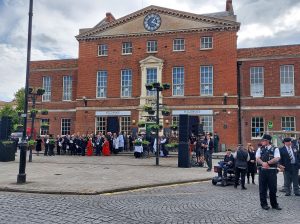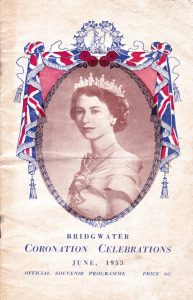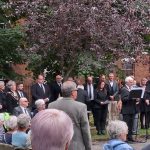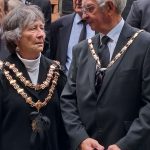
Of course, Charles Prince of Wales has been King since his mother Queen Elizabeth II passed away on Thursday 8th September 2022, but it wasn’t until Sunday 11th September that the news reached Bridgwater. A proclamation was read out next to the Market House in Taunton at 1pm and then again at Bridgwater’s King Square at 4pm. In the olden days that’s how the news would travel. In Taunton the high and mighty from across the County gathered in Mayoral robes and ‘I’m a Councillor’ badges, accompanied by the military, horse-backed Police, a few sailors, and a musical accompaniment for a singing of the National anthem….sounding awkwardly like ‘God Save the Quing’, from the 500 or so in the crowd. The proclamation was read by (for those who didn’t realise we had one) the Lord Lieutenant of Somerset. Now, this is a lady called Annie Maw and don’t worry if you don’t remember voting for her because these aren’t elected posts, the Monarch simply chooses them. Then the proclamation was sent around the county to be read again. In Bridgwater it was down to Sedgemoor District Council, whose Chairman Alan Bradford was at the microphone, read the proclamation, possibly accidentally declared Lord Charles, as King at one point, and then led everyone in a very passable rendition of the National Anthem sung by himself into said microphone. That’s what happened in 2022 in Somerset. But what have we done in the past? Bridgwater historian Dr Miles Kerr-Peterson has produced a web page devoted to his research on the subject which reveals some interesting historical facts regarding our town and its attitude to the Royals and Royal occasions.

In 1685 the rebel town of Bridgwater had in fact declared James Duke of Monmouth as King James III from the High Cross (roughly in front of the Cornhill ) by proclamation of Mayor of Bridgwater Alexander Popham– and Taunton had done the same a day earlier, from exactly the same point as the 2022 Proclamation. For both towns that ended in tragedy as James II (the actual King) sent down an army to crush them at the Battle of Sedgemoor. Bridgwater (and Taunton) people were sent to the West Indies as slaves or executed and hung from trees. Bridgwater remained on the anti-Royal list for 300 years. I suspect mutually.
It is of course important to put these facts in their historical context. In 17th Century England the country had fought a civil war about the power of Kings and executed one at the end of it and then had a Republic for 11 years. By the time of the Monmouth rising James II was looking like the kind of over powerful Feudal King that people had fought to get rid of. So, there was a move to a ‘constitutional monarchy’ as we have today, where Parliament is Sovereign and the Monarchs are just there for ceremonial purpose.
Bridgwater celebrated coronations and other key Royal events through the 19th century and into the 20th century including massive pageants with a military presence usually provided by the uniformed yeomanry. But little is recorded in history books of Bridgwater’s 18th century responses, and it could be concluded that the people were a little too sore about the 1685 backlash…as indeed were the monarchs.
During the 18th century the ‘Jacobites’ of the ‘Stuart’ line (James II/Jacob, that is, who was finally deposed in 1688, and his successors) continued to try to claim the throne of England (and Scotland) (and Ireland). Being ‘Catholic’ and ‘Feudally inclined’ this wouldn’t have gone down well in strongly protestant Bridgwater anyway. So whilst today’s Charles has declared himself the third- thereby likely losing the Jacobite vote (who believe Bonnie Prince Charlie was the rightful Charles III) any Bridgwater Royalists would have had no problem with this.
The 19th Century
William IV and his Queen Adelaide were celebrated on 8 September 1831, mainly by several ‘public dinners’, but there was clearly concern that there would be political dissent and the reports seem to hint that in fact there was some dissent at some events. It was a turbulent time. It wasn’t long since the Manchester Yeomanry had rode into the democracy protestors at Peterloo killing 15 people and injuring some 700 others. In the 1830s Bridgwater was a Whig town and in 1835 would even elect a Radical Chartist, John Temple Leader, as their MP, so the Monarchists were probably right to have concern.

Queen Victoria had her coronation day on June 28, 1837 and by this stage the Corporation were confident enough to walk to St Mary’s church and then process through the town thereafter. However, for her Golden Jubilee -20 and 21 June 1887, the Town set up a jubilee committee to plan the event. This turned out to be a large military procession led by the Mayor and corporation plus the yeomanry, magistrates and finally, the ‘general inhabitants’. It ended up in St Mary’s church, singing the National Anthem on the Cornhill and then a free dinner at the Market House for 700 poor persons over 60. Interesting that at a time of such great opulence, wealth and Empire, that there WERE 700 poor people…and aged over 60 at that….particularly as average life expectancy in the 19th century was 40.
That said the whole point of having a monarchy is to make it popular – gone (presumably) are the days when a King would ride through your town with his armed retinue and hang draw and quarter you for suggesting he might not rule by ‘divine right’. So also at the Victoriana Jubilee 3,000 children were provided with tea and games were organised. 2,000 people attended a public fete at Blacklands (that’s Brewery field now) and 4,000 commemorative medals were distributed.
Queen Victoria was, until recently, our longest reigning monarch and she had even a Diamond Jubilee. This was 22 June 1897. The town had plans to build a new almshouse, add trees across the town and build a statue to Blake. Instead they held a Mayors procession. This also included a military presence, marching bands, hymns being sung on the Cornhill, the national anthem and then three cheers. 3,000 children were given tea, a sports gala was held and a fireworks display.
The 20th Century

Five years later Victoria had passed away and it was the coronation of Edward VII and Alexandra. 9 August 1902. The main event of the day was the opening of Blake Gardens. A completely civic affair with Mayors and councillors in leading roles, Mayoresses planting oaks and Aldermen making speeches professing the ‘Loyal Borough of Bridgwater’ and ‘God save the King’. And how does this work when they were opening a public park in the memory of that ardent republican and vanquisher of Royalists, Robert Blake? A conundrum that survives to this day.
Another interesting feature of the 1902 coronation celebration was the erection of a ‘triumphal arch’ between the narrowest points of where Penel Orlieu meets High Street.
George V was the King during the first world war. He was ‘proclaimed’ King on Tuesday 10th May 1910 from the Cornhill in Bridgwater by Mayor Sully. Soldiers fired a volley, a ‘feu de joie’..’fire of joy’ (which basically means you try not to kill anybody), the cheers, the national anthem, the pomp, the ceremony…..and then the following year the actual coronation (22 June 1911) . At this they even sold tickets to attend and gave what was raised to the ‘poor over 65’ and ‘medals’ to children under 14. The town filled with bunting, the church bells rang from early morning, processions by the military and the Scouts traversed the town, 2 entire companies of the Somerset Light Infantry fired more rounds over the heads of the crowds and then they all marched to a big gala on the Taunton road football ground (later the Albion ground off Broadway).
Mayor Henry Pollard was officiating. No stranger to the military himself as it had been him when Mayor in 1896 that had summoned the Gloucestershire regiment to the town to rescue the council from being locked in the Town Hall by 3,000 striking brickworkers and then found themselves locked inside as well. Plus the 100 county police that had been sent. Finally, he read the riot act and the troops bayonetted people off the streets and restored order. Oddly, the barricades thrown up by the defending strikers on Penel Orlieu seem to be a little commemorated part of the towns history…
Anyway, in 1911 Pollard and the corporation and the military were flavour of the month. Who would guess that with these levels of jingoism the Nation…and all the other Nations…..would be at war with each other within three years.

Edward VIII -1936 -was never crowned king. But presumably he was proclaimed king….pretty soon after his father George V died on 20 Jan 1936. However, there was to be no coronation as by 11 December same year he’d gone. Not sacked due to his links to the Nazis, but due to his romantic insistence on marrying the woman he loved. Who happened to be divorced. Twice. Well, she was mid divorce with the second one…but the Prime Minister wasn’t happy that she was the sort of Queen we wanted, so given that (lack of) choice, the King abdicated. And then 4 years later the Second World War broke out…so just as well really.
George VI and his Elizabeth (who we all know better as the ‘Queen Mother’) had their coronation on 12 May 1937. Of course his real name was Albert. Or ‘Bertie’. But we probably didn’t want a ‘Bertie’ on the throne during WW2. His proclamation was on December 12 1936, and Bridgwater likely just breathed a sigh of relief that his brother had gone. This was the mid 1930s, an incredibly harsh time of poverty and recession with the rise of fascism across Europe and a war looming. In Bridgwater the Unemployed were marching through the town in protest at the cost of living crisis and an unpopular Government was reeling from it’s ridiculous decisions. Something we’d never see again….er…..

So at this time of profound austerity how would Bridgwater respond? Cautiously? Respectfully? or would it be ‘party party!’
Yep, the latter.
The Cornhill had a giant crown fitted on it and the rest of the town was piled high with bunting. The Town Hall itself decked with garlands and ‘God Save the King’ on a massive banner stretched across the whole building. And this time TWO Coronation arches were erected, at either end of town bridge. Children, patients, people in the workhouse (lovely!) (they still had a workhouse!) were all provided with supper. ‘Can we have some more?’ , Probably not.
However, there was a special ball in Blake Gardens and a special carnival procession and even a special bonfire appeared out of all this ‘you’ve never had it so bad‘ period in British history.
And then they had World War Two.
After the war we hit another period of austerity as the world had to pay for the war. Mainly to the Americans. But by 1952 we were coming out of it and it was then that we had the only living Monarch that most of us have known throughout our lives.

King Bertie died 6 February 1952 and his daughter Elizabeth II proclaimed Queen that same day. It was June 2nd 1953 that her coronation took place. In Bridgwater it was again a major event. Mayor George Heyball (and this was at the time of the Labour Borough Council) announced a series of celebrations from Sunday 31st May to Wednesday 3rd June. Mind you, they added threepence to the rate to raise the funds. The programme included ‘divine service’ at St Mary’s, Community Hymn Singing in Blake Gardens, a ‘Youth vigil’ (in Fore Street) (in case they saw any youths..), a telegram ‘of loyal greeting’ TO the Queen from the Mayor, then a ‘live broadcast’ from St Mary’s church via the new medium of the ‘telly-vision’ (aided by ‘Aclands’).
On Coronation day (the Tuesday 2nd June) there was a gathering at the Cornhill where the Mayor addressed the people, ‘Land of Hope and Glory’ was sung and the civic procession then wandered off to Blake gardens to plant another Oak tree. That evening there was a special carnival procession (which went from St John Street to West Street and back to the Cornhill for dispersal) followed by a ‘Coronation Dance’ at the Town Hall and an ‘Olde Tyme’ Ball at the Blake Hall. The Church Bells peeled out at different times of the day.
On the Wednesday they held community sporting events, mainly at the Albion ground on Taunton road. At the same time the Borough committed itself to providing a community park on the Sydenham estate and thats why we have Coronation park on Parkway.
In 1953 they set up a ‘Coronation committee’ to decide what the people wanted. Next year (2023) there will (I’m pretty sure) be a coronation for King Charles III (or IV if you’re a Jacobite) and towns across the country will have to decide what to do about that.
Into the 21st Century
Back to 2022….and the local proclamations.
In Bridgwater, Sunday 11th September 2022, organised by Sedgemoor District Council, went like this.
4pm Chairman of Sedgemoor Cllr Alan Bradford reads the proclamation to an assembled group of towns folk, slightly fumbles the ‘Lord Charles’ bit, but we got the gist, and then sings the national anthem (joined by some of the crowd). Reverend Suse from St Mary’s offers up a prayer.
In the assembled group, but not invited to speak, was Cllr Liz Leavy, Mayor of Bridgwater, asked to cover the towns emblem on her chain in black, which she did.
Bridgwater Town Council was the junior partner in all this and next year there will be a Coronation. We don’t yet know when. But there won’t be a Sedgemoor.
Maybe the public would like a Coronation Committee to do the planning??
You can read Miles Kerr-Peterson’s excellent research site on Bridgwater Coronation Celebrations on the Bridgwater Heritage Group website here.





